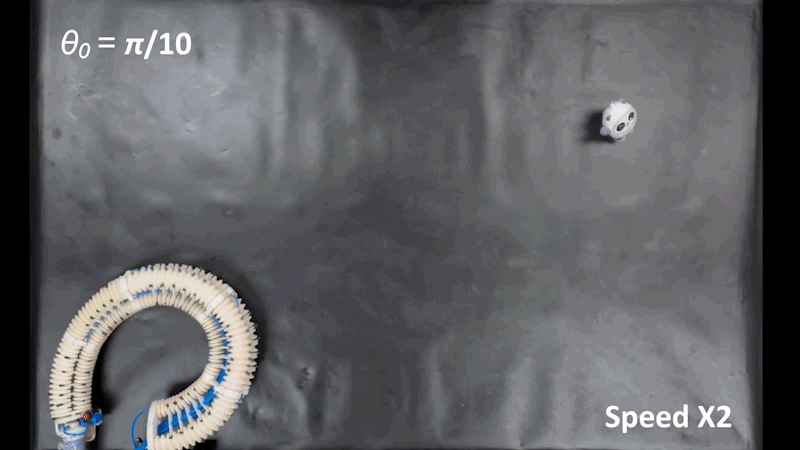Hello Nature readers, would you like to get this Briefing in your inbox free every day? Sign up here.
A soft robotic tentacle inspired by octopuses can grasp small objects in air or water.Credit: Li Wen
How does it feel to have an octopus arm?
Researchers have developed a soft robotic tentacle that can mimic the elegant snatch and grab of an octopus snaring its prey. The tentacle is operated wirelessly with a one-finger glove lined with three suction cups that translate the sensation of the robot’s suckering effect to the user. The octobot consists of soft silicone segments embedded with ‘wires’ made from a liquid metal and is equipped with suckers and temperature sensors at its tip.
Nature | 5 min read
Reference: Science Robotics paper
Swine flu appears mysteriously in the UK
A strain of swine flu has been detected for the first time in a person in the United Kingdom. There’s no evidence that swine flu is spreading in the country, and the person has recovered fully. Spillover infections of respiratory viruses from animals to people are common, and usually go unnoticed because the person doesn’t feel ill and the virus travels no further. But swine flu is tracked closely because, in 2009, it caused a human pandemic that killed an estimated 284,000 people. The virus detected in the UK individual was influenza A subtype H1N2, which is known to have infected 50 people worldwide since 2005. Health authorities are investigating how the person was infected with the H1N2 virus, and are monitoring for signs that it is capable of human-to-human transmission.
Nature | 5 min read
Biggest human genome set is now out
The UK Biobank today released the world’s largest collection of full human genomes. It includes complete, anonymized 3-billion-letter genome sequences from all 500,000 people in the database. The UK Biobank has already given rise to more than 9,000 publications, and the latest data could be used to further probe the genetic basis of health and disease. When scientists “want to know what are the pathways from lifestyle, environment, genetics to disease, they don’t go Google, they go to UK Biobank”, says the repository’s chief executive, Rory Collins.
Nature | 4 min read
AI robot creates new materials
An autonomous chemistry system called the A-Lab combines robotics with artificial intelligence (AI) to make new materials that could find use in batteries or solar cells. In only 17 days, the A-Lab made 41 new inorganic compounds. For each, the system combed through more than 30,000 published procedures, planned and executed the synthesis, analysed the results and, if necessary, made decisions about how to improve the procedure. The suggestions for what to make came from another AI system, created by Google DeepMind. It predicted 381,000 new materials by learning from and tweaking the composition of known ones.
Nature | 6 min read
References: Nature paper 1 & paper 2
Features & opinion
Solar panels might be getting an upgrade
Materials called perovskites could help solar panels to deliver 20% more power than the current silicon-only technology. Rather than totally replacing silicon, a dozen or so companies are layering perovskites on top of the less-efficient material to create tandem cells. But there are worries about tandems’ durability. And solar panels are already so cheap that some critics argue there’s no real need for an upgrade. But where space is tight, the technology could be a game-changer — if it can break into a notoriously competitive market.
Nature | 14 min read
Video: Super hot plasma stabilized
Plasmas can be hard to control, and existing methods require specialist equipment. Now, researchers have discovered a technique that uses carbon fibres to create a stable plasma with a uniform temperature — and they say their kit will be much easier to construct than current apparatus.
Nature | 3 min video

